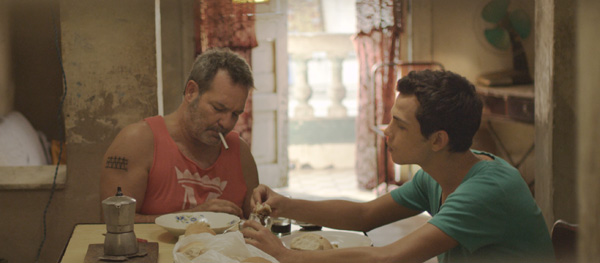Reuniting with your long-lost father can be a wonderful surprise, unless you’re an aspiring drag queen and your dad is a drunken ex-boxer who hates gays and throws a mean punch. That’s the fraught story line of Paddy Breathnach’s Viva, a film that rises above a pedestrian premise with immersive views of Havana and a sweet message of faith and forgiveness.
A gentle, pretty young man, Jesus (Héctor Medina), tries to make ends meet in the Cuban capital. His Havana is rich in unhurried afternoons and chance meetings with friends but light on moneymaking opportunities for a lonely boy without connections. Elegant yet freewheeling camerawork following Jesus’s solitary figure creates a wonderful sense of the crumbling cityscape, where hustlers prowl and secrets hide behind a dolce far niente vibe.
Jesus does hair on an ad hoc basis for a troupe of brassy, loudmouth drag queens who perform in a tourist gay bar lip-synching to melodramatic pop tunes. Tempted by their earnings and timidly drawn to their flamboyance, the shy hairdresser tries little by little to join the ranks. Letting loose in drag awakens big, dramatic emotions in him. It also leads to an unexpected—and violent—reunion with a father long gone from the picture. Jesus’s dad, Angel, reappears fresh from prison as a bitter, slaphappy bruiser who takes a dim view of his son’s camping it up in women’s clothing. When he aggressively settles into Jesus’s apartment for angry drinking bouts, it raises the question whether this relationship can develop from a distinctly unpromising start.
Given what a nasty piece of work Angel is, the rapport will be a challenge, and Viva may make Jesus too nice to make the challenge real. He’s too patient, too unblemished by consorting with ruffians, and too unscathed by some very unpleasant choices he is forced to make. The film also feels old-fashioned in its portrayal of the liberating powers of drag to turn uptight ducklings into glorious swans.
On the flipside, Viva’s weaknesses eventually emerge as strengths. Belying a gentle exterior, Angel shows force of character and will to preserve an important bond no matter how tough the going gets. Jorge Perugorría lets hints of bygone charm shine through Angel’s battered, weary façade, and the sincerity is also moving in Medina’s soulful performance. Additionally, Luis Alberto García as a tough-as-nails drag den mother hell-bent on protecting Jesus adds a jolt of stern moral fiber. The characters live by their wits in a setting that, for all its lazy charm, offers nothing but dead ends.
Viva winds down with a teary ending, adds a note of hope, and surfaces from banality as a class act. It takes measure of what kindness and love for our fellow human beings can do in life, film, and even where brassy, loudmouth drag queens are concerned.







Leave A Comment